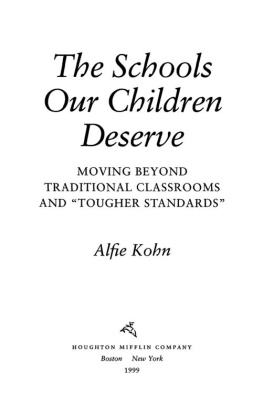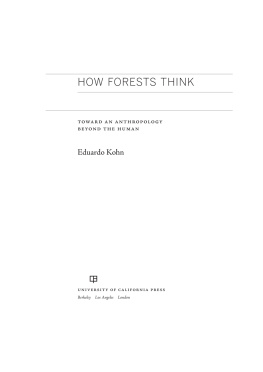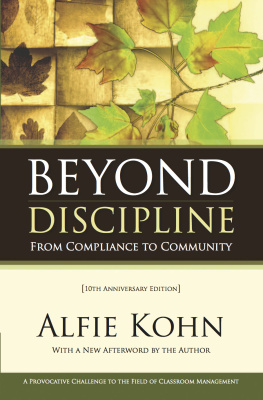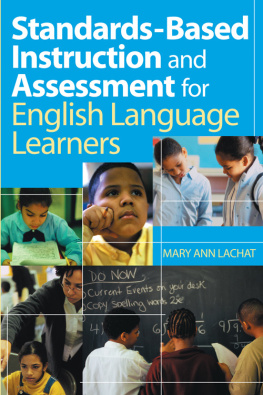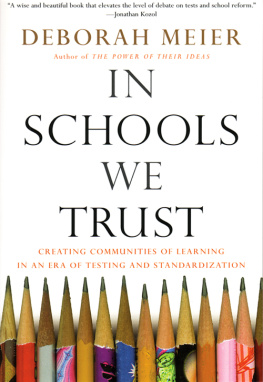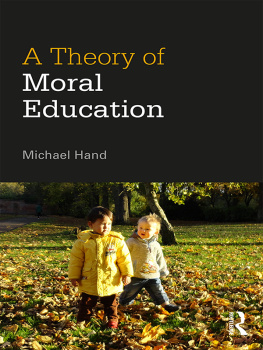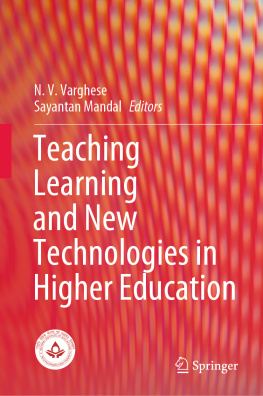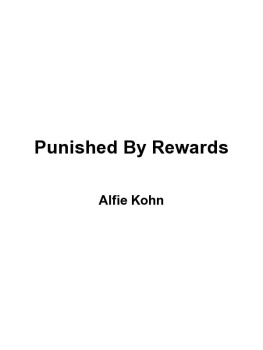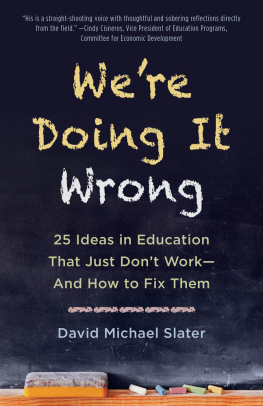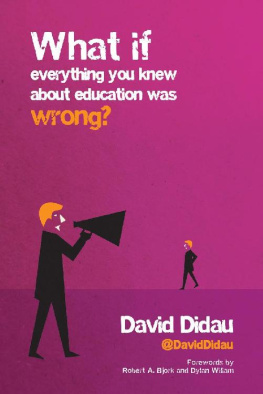HOUGHTON MIFFLIN COMPANY
Boston New York
1999
Copyright 1999 by Alfie Kohn
All rights reserved
For information about permission to reproduce selections from
this book, write to Permissions, Houghton Mifflin Company,
215 Park Avenue South, New York, New York 10003.
Library of Congress Cataloging-in-Publication Data
Kohn, Alfie.
The schools our children deserve : moving
beyond traditional classrooms and "tougher
standards"/Alfie Kohn.
p. cm.
Includes bibliographical references (p. ) and index.
ISBN 0-395-94039-7
1. School improvement programsUnited States.
2. EducationAims and objectivesUnited States.
3. Educational changeUnited States. I. Title.
LB2822.82.K65 1999
371.2'00973dc21 99-31122
CIP
Printed in the United States of America
QUM 10 9 8 7 6 5 4 3 2 1
Contents
1 F ORWARD ... INTO THE P AST
P ART O NE :
TOUGHER STANDARDS
VERSUS BETTER EDUCATION
2 G ETTING M OTIVATION W RONG :
The Costs of Overemphasizing Achievement
3 G ETTING T EACHING AND L EARNING W RONG:
Traditional Education and Its Victims
4 G ETTING E VALUATION W RONG :
The Case Against Standardized Testing
5 G ETTING S CHOOL R EFORM W RONG:
The Arrogance of Top-Down Coercion
6 G ETTING I MPROVEMENT W RONG :
Confusing Harder with Better
P ART T WO :
FOR THE LOVE
OF LEARNING
7 S TARTING FROM S CRATCH
8 E DUCATION AT I TS B EST
9 G ETTING THE 3 R' S R IGHT
10 T HE W AY O UT
Appendix A:
T HE H ARD E VIDENCE
Appendix B:
W HAT TO L OOK F OR IN A C LASSROOM
Notes
References
Acknowledgments
Index
1. FORWARD ... INTO THE PAST
Abigail is given plenty of worksheets to complete in class as well as a substantial amount of homework. She studies to get good grades, and her school is proud of its high standardized test scores. Outstanding students are publicly recognized by the use of honor rolls, awards assemblies, and bumper stickers. Abigail's teacher, a charismatic lecturer, is clearly in control of the class: students raise their hands and wait patiently to be recognized. The teacher prepares detailed lesson plans well ahead of time, uses the latest textbooks, and gives regular quizzes to make sure kids stay on track.
W HAT'S WRONG with this picture? Just about everything.
The features of our children's classrooms that we find the most reassuringlargely because we recognize them from our own days in schooltypically turn out to be those least likely to help students become effective and enthusiastic learners. That dilemma is at the heart of education reformor at least at the heart of this book. On the relatively rare occasions when nontraditional kinds of instruction show up in classrooms, many of us become nervous if not openly hostile. "Hey, when I was in school the teacher was in front of the room, teaching us what we needed to know about addition and adverbs and atoms. We paid attention and studied hard if we knew what was good for us. And it worked!"
Or did it? Never mind all those kids who gave up on school and came to think of themselves as stupid. The more interesting question is whether those of us who were successful students "achieved this success by memorizing an enormous number of words without necessarily understanding them or caring about them." Is it possible that we are not really as well educated as we'd like to think? Might we have spent a good chunk of our childhoods doing stuff that was exactly as pointless as we suspected it was at the time?
It's not easy to acknowledge these possibilities, which may help to explain the aggressive nostalgia that is loose in the land. Any number of people subscribe to the Listerine theory of education: the old ways may be distasteful, but they're effective. Doubtless, this belief is reassuring; unfortunately, it's also wrong. Traditional schooling turns out to be as unproductive as it is unappealing. Thus, we ought to be demanding nontraditional classrooms for our kids, and supporting teachers who know enough to reject the siren call of "back to basics." We ought to be asking why our children aren't spending more time thinking about ideas and playing a more active role in the process of learning. In such an environment, they're not only more likely to be engaged with what they're doing but also to do it better.
Parents have rarely been invited to consider this point of view, which is why schools continue operating in pretty much the same way, using pretty much the same set of assumptions and practices, as the decades roll by. In this chapter, I'll try to explain what traditional schooling is, then make the case that it's still the dominant model in American education and explain why this is so. After that, I'll turn to a more recent, and closely related, phenomenon: the widespread call to raise "standards" that has come to dominate discussions about school reform. Once we understand more about the support for traditional teaching and for Tougher Standardsarguably the two dominant forces in our educational systemwe'll be ready to analyze them critically and explore alternatives that may make more sense for our children.
Two Models of Schooling
Let us begin by acknowledging that there are as many ways of teaching as there are teachers. Anyone who attempts to apply a single set of labels to all educators will be omitting some details and ignoring some complicationsnot unlike someone who describes politicians in terms of how far they are to the left or right. Still, it isn't entirely inaccurate to classify some classrooms and schools, some people and proposals, as tilting toward a philosophy that is more traditional or conservative as opposed to nontraditional or progressive. The former might be called the Old School of education, which of course is not a building but a state of mindand ultimately a statement about the mind.
When asked what they think schools ought to look like, some back-to-basics proponents cite the importance of "obedience to authority" and list certain favored classroom practices: "Students sit together (usually in rows) and everyone follows the same lesson. Missing are ... clusters of youngsters working at a pace and on a topic of their own choosing. In basics classrooms, lines of responsibility are very clear; everyone knows his or her task and recognizes who is in charge." The idea is to have students memorize facts and definitions, to make sure that skills are "drilled into" them. Even in social studies, as one principal explains, "We are much more concerned about teaching where Miami is than about Miami's problem with Cubans."
In the Old School, reading lessons tend to teach specific sounds, such as long vowels, in isolation; math classes emphasize basic facts and calculations. Academic fields (math, English, history) are taught separately. Within each subject, big things are broken down into bits, which are then taught in a very specific sequence. The model also tends to include traditional grades, plenty of tests and quizzes, strict (punitive) discipline, competition, and lots of homework. Anything that deviates from this model is often reviled as a fad, with special scorn reserved for efforts to teach social skills or address students' feelings, to have students learn from one another, to use nontraditional ways of assessing what they can do, as well as to adopt bilingual education, a multicultural curriculum, or a structure that brings together students of different ages or abilities.
Nontraditional or progressive education is defined in part by its divergence from all of this. Here, the point of departure is that kids should be taken seriously. Because learning is regarded as an active process, learners are given an active role. Their questions help to shape the curriculum, and their capacity for thinking critically is honored even as it is honed. In such classrooms, facts and skills are important but not ends in themselves. Rather, they are more likely to be organized around broad themes, connected to real issues, and seen as part of the process of coming to understand ideas from the inside out. A classroom is a place where a community of learnersas opposed to a collection of discrete individualsengages in discovery and invention, reflection and problem solving.
Next page
